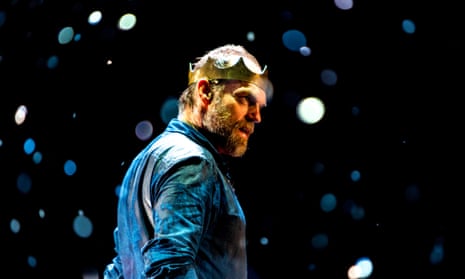The risks of this production are there from the moment the audience enters the Sydney theatre. We do so through a side door, to be seated on the stage with the auditorium as a backdrop. Two hours long with no interval, this tight configuration offers us no chance to leave.
The director, Kip Williams, was also a risky choice for Andrew Upton and the Sydney Theatre Company for such a benchmark production – a relative newcomer and a resident director rather than a big name brought in from elsewhere. That name, instead, is Hugo Weaving in the title role. But their collaboration – an innovative staging and stunning central performance – turns Shakespeare's play around literally and creatively.
Macbeth starts slow and this production particularly so, with just a bare table in front of an empty auditorium. The witches, played by Robert Menzies, Kate Box and Ivan Donato, fail to draw us in, their use of water almost drowns the opening scene rather than giving it life.
It is also clear from early on that Melita Jurisic is miscast as Lady Macbeth, or at least misconceives the role. She's a fine actress but her queen-to-be is haggard and a little too mad from the start. She has enormous power over her husband but their relationship feels more like mother and son – the sexual chemistry is lacking. In some early moments, too, Shakespeare’s language isn’t given the space it requires. The play's defining monologue, “Is this a dagger which I see before me?”, feels rushed and lacks punch, despite being staged in a clever new way.
But as thunder develops and a dramatic fog builds, the show hits its stride. Williams uses the auditorium to full effect, helped by amazing light and sound design (much credit to Alice Babidge, Nick Schlieper and Max Lyandvert). Characters watch the action from random seats, Banquo meets his untimely end between two rows and, in a key speech, Macbeth moves through the auditorium row by row and line by line, the tension building as he progresses towards his subjects and the audience.
The banquet is not just frightening but frighteningly good, the long table gloriously dressed and the ensemble truly terrified as Macbeth faces Banquo’s ghost. And in the final act, the snow effect creates moments of true beauty – and tension – on stage.
Above all this stands Weaving’s faultless performance, making the most of the role in every line. Like the best Macbeths, his delivery is powerful but tragic. This king is human, most of all, and when he cries, we want to cry too. The fight scene is reimagined into a dramatic climax, with Macbeth alone on stage. Stunningly lit, this is an overwhelmingly physical portrait of a man struggling with his sword, and his demons.
John Gaden is brilliant, not just as Duncan but also as a child, the casting of an older actor a clever reference to this boy being tragically old before his time. Menzies gives clarity to various roles and Paula Arundell is a fine Banquo, though some of the other ensemble performances are not as strong.
But ultimately we have Weaving, who has found the role of his career. And he has done so with Williams, who should now be confirmed as a major directing talent. Together their vision is often startling but always shows the play full respect. It’s a thrilling combination.

Comments (…)
Sign in or create your Guardian account to join the discussion